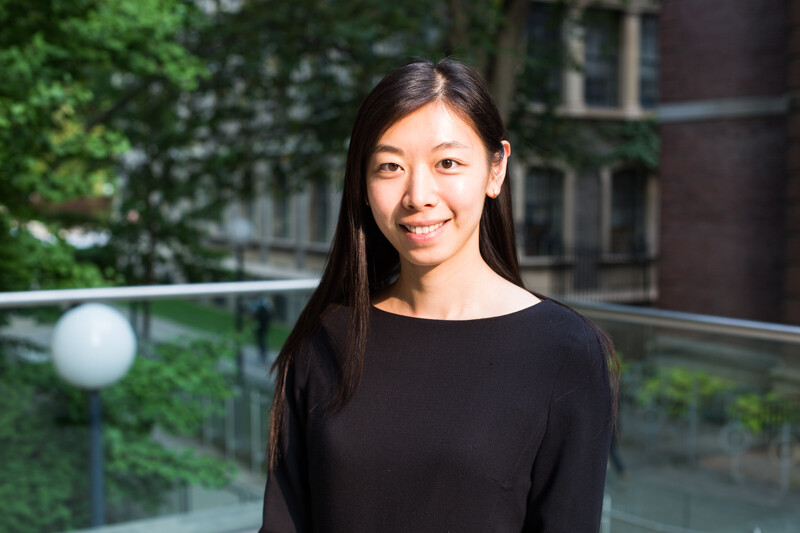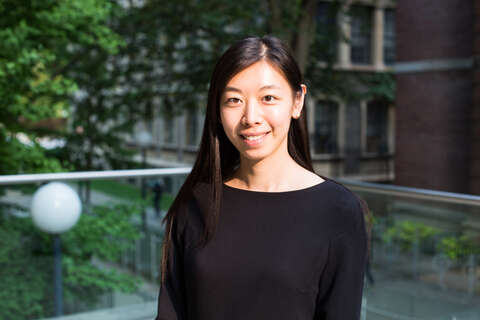Breadcrumbs
- Home
- MD/PhD Program
- News
- Faces of U of T Medicine: Stephanie Zhou
Faces of U of T Medicine: Stephanie Zhou


When Stephanie Zhou published her opinion piece, Underprivilege as Privilege, in the Journal of the American Medical Association, she had no idea how strongly it would resonate — with both her peers and practicing physicians. In addition to sharing her own story, the fourth-year medical student is also actively involved in helping others from diverse backgrounds reach their goal of applying to medical school through the Faculty of Medicine’s Diversity Mentorship Program (DMP) and Summer Mentorship Program (SMP). Zhou recently spoke with writer Erin Howe about these experiences.
What inspired you to write your article, Underprivilege as Privilege, for the Journal of the American Medical Association?
I’ve been writing reflections on various experiences and observations since entering medical school, but I never published them because I wanted a space where I can ponder things without fear of judgement – like a diary of sorts. I can’t identify a single event, but I think it was a combination of being exposed to conversations on classism from first-in-family colleagues, mentoring younger students who experienced ‘imposter syndrome’ and encouragement from students who have read my written pieces before that prompted me to publish this piece.
During my time here, I‘ve found there’s been growing acceptance and open conversations on encouraging women, cultural diversity, and LGBTQ groups in medicine as evidenced by the student clubs that support these mentorship initiatives. I think this is great because it suggests an openness in the medical community to consider recognizing other areas of underrepresentation should they present themselves. Other than financial support, there isn’t a student or faculty-led initiative that provides support for students who are first in family or low-income, however I feel that this need exists amongst students but is harder to talk about due to the stigma.
The other barrier is that as a medical student or doctor, you are already considered privileged by the public and it may seem out of place to talk about underprivilege. Making sure I recognized my own privilege was one of the challenges in writing this piece. The other challenge was trying to develop a balanced perspective, I think students who come from backgrounds where they were exposed to certain social factors might have an innate understanding of these factors in their patients, but this doesn’t mean those from well-supported upbringings can’t develop the same understanding through taking the initiative to learn about their patients’ socioeconomic barriers. I think schools currently recognize the latter, but there aren’t as much opportunities for students to showcase the former.
What’s the response to your column been like?
I didn’t expect such an enormous response!
I was on call when the column was released online and wasn’t checking twitter or my email. It wasn’t until the next day when I got home that I realized it had gained significant traction. I received messages from people around the world with similar experiences who hadn’t wanted to speak publicly because they felt no one else would relate. I also received emails from other current and prospective medical students who felt the same way but didn’t know how to verbalise these thoughts.
I’m in awe of the stories of high-achieving clinicians who come from humble beginnings and I’m glad to see my words can be interpreted differently depending on readers backgrounds, which has opened my eyes to new perspectives. For example, people who come from non-traditional or non-science backgrounds might also feel a desire to find their own identity in medicine. Medical students and doctors with children have also expressed a divide in the different lives their children will have compared to their own first-generation immigrant identities, for instance.
Tell me about your role with the SMP and what prompted you to become involved with the program.
When I was applying to medical school, finding a medical student who could give information on the application process — or even read your application and give you feedback — was a tremendous help. Finding this kind of assistance can be daunting, especially if you’re shy to ask a stranger. There are also consulting services which, for a fee, allow applicants to meet with a medical student to learn about the application process or have their essays edited. These services are expensive and weren’t an option for me. SMP offers identical services for free. This can be an invaluable resource for students who can’t afford to hire someone to give application advice or read and edit their essays.
While you’ve been in medical school, you’ve also been an active volunteer with a few community organizations. What are kind of volunteer work are you doing now?
I’m on the executive team with Homeless Connect Toronto, an annual event for over 700 homeless and precariously housed people in the city. It brings representatives from more than 150 organizations together in one place. We also provide free transportation to help people attend this downtown event. The participating organizations offer many of the services and supports needed by the homeless, including foot, dental and eye care, ID clinics, a free lunch, a clothing bank and more. There’s a high return rate by our attendees because they value the collegiality the event brings, the convenience and variety of resources. It’s different from seeing homeless people in a healthcare setting, where there are frequent no-shows or lack of compliance with treatments.
What’s your favourite thing about the Faculty of Medicine?
My favourite thing is that the Faculty of Medicine embraces change and recognizes its student body should reflect the diversity of the patient population. The medical program at U of T has been a leader in changing the admissions process for students in Canada. This year, U of T implemented the Black Student Application Program and I will be working with the Diversity Office on the Diversity Mentorship Program to support underrepresented students post-admissions.
What do you do when you’re not studying or at the hospital?
I enjoy catching up with friends who aren’t in medicine because it’s interesting to hear about what life’s like in fields I’m not immersed in. I’m also a longstanding follower of the series Game of Thrones, though it has been hard to watch each episode on time — especially when I have weekend call on Internal Medicine.